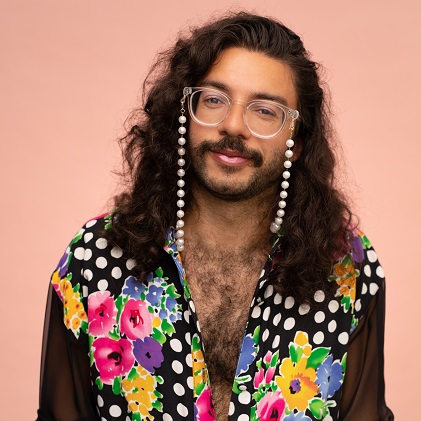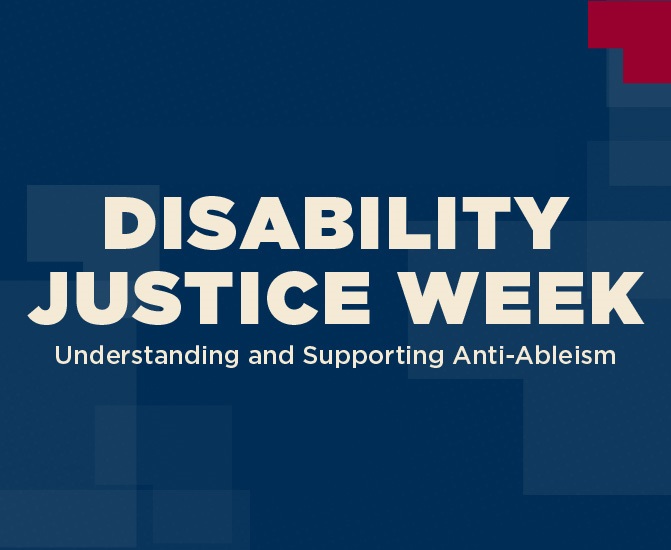October is Washington’s Disability History Month and National Disability Employment Awareness Month. To celebrate, join Renton Technical College for Disability Justice Week, October 20–24! This will be a week of programming that celebrates and examines the intersectionality of the disability experience through enriching learning formats including lectures, presentations, and more. Programming this year is focused on the theme Supporting All Abilities.
Pictured above: RTC email banner in blue color block with burgundy accents promoting Disability Justice Week.
Events
Keynote Address – Alex Locust: Spill the Disabili-Tea: An Interactive Dive into Disability
Justice
- Tuesday, October 21
- Noon – 1:30 p.m.
- RTC Cafeteria (Building I) & Virtual (Zoom)
Alex Locust is a Black biracial, queer, disability justice educator, activist, and "Glamputee" who celebrates the harmony of his identities to help create the world they want to see. Born disabled (above-the knee-amputee), Alex learned to navigate an ableist world that told him and other disabled people harmful, violent, and reductive ideas around which bodies are worthy and which bodies are beautiful. Armed with bombastic charm, whimsical humor, and a sharp wit, Alex synthesizes his lived experience with professional insight to educate others on how to adopt a disability justice framework that builds community and empowers fellow disabled folks.
Lunch will be served beginning at 11:30 a.m.
Film Screening – Change, Not Charity: The Americans with Disabilities Act
- Thursday, October 23
- 2:00 p.m. – 3:30 p.m.
- Unity Center (Building D)
Change, Not Charity: The Americans with Disabilities Act tells the emotional and dramatic story of the decades-long push for equality and accessibility that culminated in the passage of the Americans with Disabilities Act (ADA) in 1990. While curb cuts, ramps at building entrances, and braille on elevator buttons seem commonplace today, they were once the subject of a pitched battle that landed on the steps of Congress. Told through the voices of key participants and witnesses, the film highlights the determined people who literally put their bodies on the line to achieve their goal and change the lives of all Americans. A story of courage and perseverance, the film brings to life one of the great civil rights movements in American history, where ordinary people made their voices heard and Congress responded. A testament to the power of coalition building and bipartisan compromise, the passage of the ADA is a shining example of democracy in action.
Keynote Address - ChrisTiana ObeySumner
Tuesday, October 22
12 p.m. – 1:30 p.m.
RTC Cafeteria & Virtual
ChrisTiana ObeySumner (they/them) is a Black/Indigenous, queer, non-binary, and multiply
disabled community organizer and activist. They are the CEO and principal consultant
of Epiphanies of Equity LLC, a social equity consulting firm specializing in intersectionality,
anti-racism, and disability justice. For over two decades, ChrisTiana has dedicated
their life and career to advocating for social equity—defined as the lifelong work
of deconstructing inequitable sociological impacts, including policies, institutions,
cultures, biases, and constructs, while facilitating strategic and accountable pathways
toward equitable processes and outcomes.
People First Language & The Social Justice Model of Disability
Thursday, October 24
11 a.m. – 12 p.m.
Building N, Room 202
Elizabeth Flanagan, CCP Faculty, and Jake Swanke, Director of Disability Resource Services, will discuss the importance of language and its impact on perceptions of disability. Discover the principles of People-First Language (PFL) and how it promotes respect and dignity for individuals with disabilities. We will also explore the social justice model of disability, which emphasizes how systemic, institutional, and environmental barriers create limitations to access and perpetuate ableism, rather than focusing on an individual’s disability as the barrier.
People First Language & The Social Justice Model of Disability
Friday, October 25
10 a.m. – 11 a.m.
Virtual
Elizabeth Flanagan, CCP Faculty, and Jake Swanke, Director of Disability Resource Services, will discuss the importance of language and its impact on perceptions of disability. Discover the principles of People-First Language (PFL) and how it promotes respect and dignity for individuals with disabilities. We will also explore the social justice model of disability, which emphasizes how systemic, institutional, and environmental design create barriers to access, rather than focusing on an individual’s disability as the barrier.
Other Resources to Continue Your Disability Justice Work
Expand Your Feed
Create space for social (and other) media to expand your understanding and engagement with the disability community. Each individual feed is working to keep us engaged and show us more of what we “like” but in doing so can leave out differing experiences and perspective. Expand your algorithm by following influencers from the disability community, selecting a book/film that explores aspects of disability, or engaging with a podcast that presents ideas from a new perspective. Check out the RTC Library and Disability Awareness LibGuide for some ideas to get you started.
Universal Design Practices & Scavenger Hunt
We live in an ABLEIST world that discriminates in favor of able-bodied people. This reality presents itself in big and small ways, but we can all do our part to notice and respond to ableism when given the right information and an available call to action. We invite you to be the eyes and ears of the RTC campus and be on the lookout for these 15 easy to identify Universal Design practices.
Physical
- Door openers are working.
- Elevators are working.
- Curb cuts are clear and available.
Social
- Speak directly to the person – not interpreter or attendant.
- Ask permission before offering assistance.
- Respect identity preferences: person-first or identity first language.
Instruction
- Syllabus has statement of support such as:
- Renton Technical College is committed to providing reasonable accommodations for all persons with disabilities. The syllabus is available in alternate formats upon request. If you have a disability that may have some impact on your work in this class and for which you may require accommodations, please contact Disability Resource Services: drs@rtc.edu / (425) 235-7854
- Alternative formats of information are offered (text, verbal, diagrams, photographs, etc)
- Videos are captioned.
Events
- Fliers and/or registration materials include an access statement stating how to request accommodations such as:
- Renton Technical College is committed to providing access and accommodation in its services, programs, and activities. To make a request connected to a disability or health condition contact [INSERT sponsoring department contact, phone number, and email address], by [INSERT specific date].
- Furniture is movable, or if fixed seating areas, accessible seating options are available to participants.
- Restrooms with accessible stalls are located near event location with clear signage.
Digital
- Videos are short in duration and divided into chapters and sections.
- Text is accessible across all student devices, including mobile technologies.
- Images are tagged with text descriptions, ideally with critical information in text rather than in an image.
Additional Resources to Learn More about Universal Design
Universal Design: Process, Principles, and Applications: The DO-IT (Disabilities, Opportunities, Internetworking, and Technology) Center at The University of Washington is dedicated to empowering people with disabilities through technology and education. It promotes awareness and accessibility—in both the classroom and the workplace—to maximize the potential of individuals with disabilities and make our communities more vibrant, diverse, and inclusive. DO-IT has helped connect the ideas of Universal Design (UD) in the educational setting by looking at how the design of teaching and learning products and environments can be usable by all people, to the greatest extent possible, without the need for adaptation or specialized design.
Accessibility at the UW: The University of Washington is a leader in disability and accessibility. Here they have provided information on accessibility best practices across teaching, learning, working, event planning, service animals, access statements, policies and regulations, as well as marketing and communications.
What Is Universal Design: The Center for Inclusive Design and Environmental Access within the School of Architecture and Planning at The University of Buffalo provides historical context for an enduring design approach grounded in the belief that the broad range of human ability is ordinary, not special. This includes the Seven Principles of Universal Design: equitable use, flexibility in use, simple and intuitive use, perceptible information, tolerance for error, low physical effort, and size and space for approach and use.
Accommodation Statement
Renton Technical College is committed to providing access and accommodation in its services, programs, and activities. To make an accommodation request connected to a disability or health condition contact Disability Resource Services at drs@rtc.edu or 425-235-6618, by October 17, 2025.
Sponsors and Committee
Sponsored by the Associated Student Government, Disability Resource Services, Office of Diversity, Equity, & Inclusion, and Division of Student Services.
Special thank you to the 2025 Disability Justice Week Planning Committee: Amaury Avalos, Chelsea Good, Ebony Jackson, and Laura Knight.
